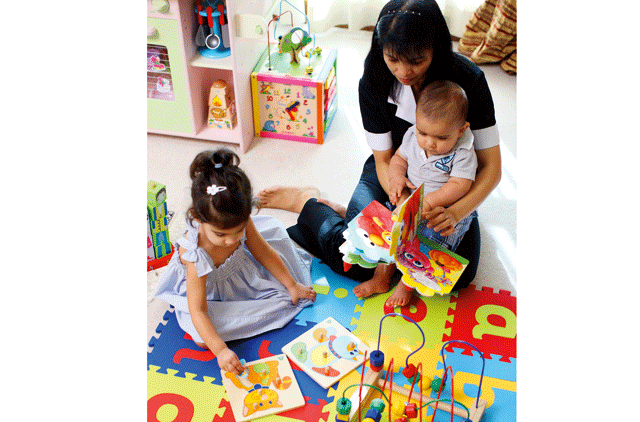
The concept of setting a routine for a baby was popularised by writer and former maternity nurse Gina Ford in her 1999 book titled The Contented Little Baby Book. She strongly advocates setting a routine for the baby that is integrated with the routine of the family. The day should be divided into precise slots for sleeping, feeding, activity and quiet time.
Many child experts and mothers have criticised this approach complaining that it is like training an animal and that it involves letting the baby cry to get him used to the schedule. But those who support the argument feel a routine allows the mother to fulfil the baby's needs before he cries and it can be tailored to suit the needs of the mother and other family members.
Emirati mother Rasha Abdul Razak has tried both ways and endorses setting a routine. "I had read Gina Ford's book but it did not make sense to me because I did not understand how to tailor the routine to my baby and I had always been told that I must meet the demands of my child as soon as he asks. I was able to manage my first baby, Sofia, without a routine since I devoted my time to her exclusively. But things became difficult when my son, Zainal was born ten months later. Neither child was sleeping through the night, they both followed different eating and sleeping routines, and after two months of sleep deprivation I was overwhelmed and needed help. So much so that I would leave them at my mother's to get some respite… Malika [Bouyazra] came to the rescue. She has put both children on individual routines so that I now have non-stressful, quality time with each child. I also have two hours for myself during the day and after puttingthe children to bed at 7.30pm I havethe rest of the evening for myself and my husband.
"Malika has also trained my nanny to follow the routine as well, so our entire household is much more organised and peaceful now. The children are getting the right amount of sleep and the right diet. And they go to their grandma because they enjoy being with her not because their mother wants them out. Some of my elders disapprove of routines and tell me that they had managed their children without this method. My answer to them is, "Think back and tell me, were you really able to spend quality time with each child?" says Rasha.
Case studies on Howa parents' state of mind can affect a baby:
Donna and Martin were both successful professionals. They had a baby quite late in life and were not prepared for the changes in lifestyle. The baby was diagnosed with reflux and slept poorly and cried all the time.
Donna was suffering from depression and withno support from other family members, thecouple was both exhaustedand overwhelmed.
"My first priority was to establish a routine that suited the needs of the baby and the parents and to teach them parenting skills to deal with their baby's specific needs. But I soon realised that Donna's anxiety was related to her bad relationship with her own mother. She was so worried about repeating this with her own baby that unknowingly she was partly responsible for her son's sleepless nights.
"I made her understand that her negative energy was affecting the baby and helped her to rebuild her relationship with her mother. This resulted in both the parents and baby being calmer and more contented," says Bouyazra.
Another of Bouyazra's clients was a well-known psychologist who, after the birth of her first baby, suffered from acute post-natal depression. "Although I stayed with her and helped her, I could see that she needed more long-term support. Her husband was extremely unsupportive, but she was reluctant to ask for help from her mother, who lived in Australia. I took the initiative to call her mother and explain the situation to her. A few months in Australia with her mother immensely helped both my client and her baby.
Later she thanked me and admitted that she was too proud to ask her own mother for help," says Bouyazra.








